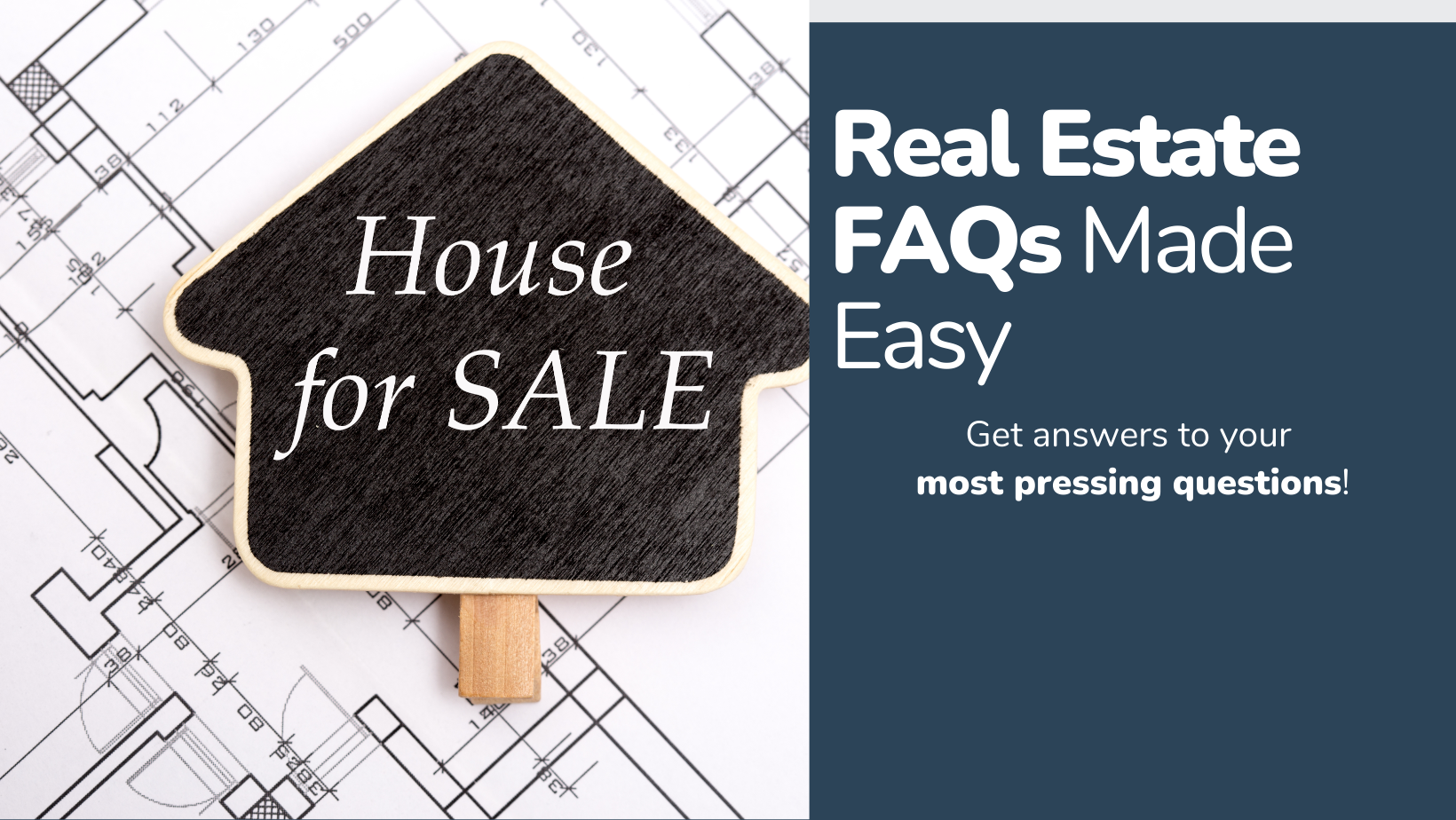Your Guide to the Most Common Questions
The real estate market can be a daunting world to navigate, whether you’re buying your first home, selling a property, or just curious about the process. To help you understand the basics, we’ve put together answers to some of the most frequently asked questions (FAQs) in real estate.
1. What’s the First Step in Buying a Home?
When buying a home, the first step is to get pre-approved for a mortgage. This will give you a clear idea of how much you can afford and show sellers that you’re a serious buyer.
Why is pre-approval important?
- It gives you a specific budget to work within.
- It helps you move quickly in a competitive market, showing you’re financially ready.
- It can provide an edge when bidding for a home, as sellers tend to favor buyers who are pre-approved.
2. How Much Do I Need for a Down Payment?
The amount you need for a down payment can vary, but most conventional loans require at least 20% of the home’s purchase price. However, there are options that require much less, especially for first-time homebuyers.
Common down payment requirements:
- Conventional loans: Typically 20%, but some lenders offer options as low as 3%.
- FHA loans: Often as low as 3.5%.
- VA loans: For eligible veterans, no down payment is required.
- USDA loans: For rural areas, 0% down payment is possible for qualifying buyers.
3. What Is the Difference Between Pre-Qualification and Pre-Approval?
While these terms are often used interchangeably, there is a key difference.
- Pre-qualification: This is an estimate of how much you may be able to borrow based on your income, debts, and other factors. It’s usually done quickly and doesn’t require documentation.
- Pre-approval: This is a more thorough process where the lender checks your credit, verifies your income and assets, and gives you an official commitment for a loan amount. Pre-approval carries more weight in the eyes of sellers.
4. What Should I Look for When Touring Homes?
When touring homes, it’s essential to look beyond the cosmetics and focus on aspects that could impact your investment in the long run.
Things to consider:
- Structural condition: Look for issues with the foundation, roof, or windows.
- Layout and functionality: Does the layout fit your lifestyle? Are there enough bedrooms, bathrooms, and storage space?
- Location: Is it close to schools, work, and public amenities? Is the neighborhood safe?
- Potential for growth: Will the property value likely increase over time?
5. What Is Earnest Money?
Earnest money is a deposit made by the buyer to show their commitment to purchasing the property. It typically ranges from 1% to 3% of the home’s purchase price.
Why is earnest money important?
- It shows the seller you are serious about purchasing the property.
- It protects the seller in case the buyer backs out without a valid reason.
- If the deal goes through, it is typically applied to the buyer’s closing costs or down payment.
6. What Are Closing Costs?
Closing costs are fees associated with completing a real estate transaction. These costs can vary but typically range from 2% to 5% of the home’s purchase price.
Common closing costs include:
- Appraisal fees: The cost of having a professional appraiser determine the value of the property.
- Home inspection fees: If you choose to have the home professionally inspected.
- Title search fees: The cost of verifying that the property’s title is clear of any legal issues.
- Insurance: Homeowners insurance, title insurance, and possibly flood insurance.
7. What Is the Difference Between a Buyer’s Market and a Seller’s Market?
The terms “buyer’s market” and “seller’s market” refer to the current conditions in the real estate market, and they affect pricing and negotiation.
- Buyer’s Market: When there are more homes for sale than buyers, leading to lower prices and more room for negotiation.
- Seller’s Market: When there are more buyers than homes for sale, leading to higher prices and less negotiating power for buyers.
Understanding the market conditions will help you determine the best time to buy or sell and how much you should offer.
8. How Long Does the Home Buying Process Take?
The home buying process can take anywhere from a few weeks to several months, depending on various factors, including market conditions, the type of property, and your financing options.
Key stages include:
- Home search: Finding the right property, which can take a few weeks.
- Offer and negotiations: Once you make an offer, negotiations may take a few days to a week.
- Inspection and appraisal: After your offer is accepted, an inspection and appraisal typically take 1-2 weeks.
- Closing: The final steps, including signing documents and transferring ownership, usually take 30-45 days.
9. Do I Need a Real Estate Agent to Buy a Home?
While it is not legally required, having a real estate agent can make the process easier, especially if you’re a first-time homebuyer. A knowledgeable agent can guide you through the entire process, help with negotiations, and ensure you don’t miss critical steps.
Benefits of using an agent:
- Expert guidance: An agent knows the local market and can offer valuable advice.
- Negotiation skills: Agents are skilled negotiators and can help secure the best deal.
- Access to listings: Agents often have access to listings before they are publicly available.
10. What Happens If I Back Out of a Deal?
Backing out of a real estate deal can come with consequences, depending on the circumstances and the stage of the process.
- Before signing the contract: If you withdraw early, you typically have little to no financial penalties, though you may lose your earnest money.
- After signing the contract: If you back out after signing a purchase agreement, you may forfeit your earnest money or face other penalties, unless there is a contingency clause that allows you to withdraw (such as issues found during the inspection).
Conclusion
Whether you’re buying, selling, or just looking to learn more about the real estate process, understanding these frequently asked questions can give you clarity and confidence. If you’re ready to take the next step, don’t hesitate to reach out with any other questions or to begin your real estate journey.
Need help navigating the real estate process? Contact me today, and I’ll guide you every step of the way!




